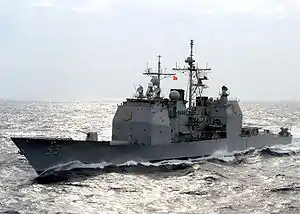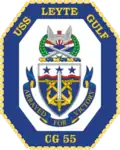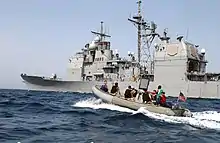USS Leyte Gulf
USS Leyte Gulf (CG-55) is a Ticonderoga-class guided missile cruiser in the United States Navy. She was named in memory of the World War II Battle of Leyte Gulf in the Pacific. She is powered by four large gas-turbine engines, and she has a large complement of guided missiles for air defense, attack of surface targets at sea and ashore, and anti-submarine warfare (ASW). In addition, she carries two "Seahawk" LAMPS multi-purpose helicopters, whose primary mission is ASW.
 USS Leyte Gulf (CG-55) underway | |
| History | |
|---|---|
| Name: | Leyte Gulf |
| Namesake: | Battle of Leyte Gulf |
| Ordered: | 20 June 1983 |
| Builder: | Ingalls Shipbuilding, Pascagoula, Mississippi |
| Laid down: | 18 March 1985 |
| Launched: | 20 June 1986 |
| Commissioned: | 26 September 1987 |
| Homeport: | Norfolk, Virginia |
| Identification: |
|
| Motto: | "Arrayed For Victory" |
| Status: | in active service |
| Badge: |
 |
| General characteristics | |
| Class and type: | Ticonderoga-class cruiser |
| Displacement: | Approx. 9,600 long tons (9,800 t) full load |
| Length: | 565 feet (172.2 meters) She lost 2 feet after colliding with the USS Theodore Roosevelt (CVN-71) |
| Beam: | 55 feet (16.8 meters) |
| Draft: | 34 feet (10.2 meters) |
| Propulsion: |
|
| Speed: | 32.5 knots (60 km/h; 37.4 mph) |
| Complement: | 30 officers and 300 enlisted |
| Armament: |
|
| Aircraft carried: | 2 × Sikorsky SH-60B or MH-60R Seahawk LAMPS III helicopters. |
On 14 October 1996, Leyte Gulf collided with the Nimitz-class aircraft carrier, USS Theodore Roosevelt while conducting operations off the coast of North Carolina. The incident occurred as the carrier, without prior warning, reversed her engines while Leyte Gulf was behind her and slammed into the cruiser's bow. There were no personnel casualties or injuries reported,[1] and damage to the Leyte was only $2 million.[2]
In 2002, she won the Marjorie Sterrett Battleship Fund Award for the Atlantic Fleet.
In March 2003 Leyte Gulf was assigned to Carrier Group Eight.[3]
_under_the_Verrazano_Narrows_Bridge.jpg.webp)
On 15 September 2007, there was a fire aboard Leyte Gulf as she underwent an extensive modernization program in BAE Systems Shipyard in Norfolk, Virginia. Initially the fire received national attention due to the possibility that it was a terrorist incident, however, it was quickly revealed to be an industrial accident. Five shipyard workers were injured in the incident, one seriously, but no naval personnel were involved.[4]
In February 2011, Leyte Gulf was involved in an incident with Somali pirates after they captured the United States flagged yacht Quest.[5]

The cruiser returned to Norfolk on 15 July 2011. During her deployment, she had participated in operations which had captured 75 Somali pirates and had missile strikes by her carrier strike group against the Libyan government.[6]
In January 2015, Leyte Gulf returned from a six-month deployment to the Mediterranean Sea. The ship served as flagship of Standing NATO Maritime Group 2 for much of the deployment.[7]
See also
References
- "USS Leyte Gulf at DCHM". Naval Sea Systems Command DC Museum. Archived from the original on 14 February 2008. Retrieved 16 September 2007.
- http://articles.dailypress.com/1996-11-23/news/9611230009_1_leyte-gulf-deck-officers-aircraft-carrier-theodore-roosevelt
- Toppan, Andrew (10 March 2003). "World Navies Today: US Navy Aircraft Carriers & Surface Combatants". hazegray.org. Retrieved 21 May 2012.
- "Fire on Navy cruiser in shipyard sends five to hospital". WAVY10 News, Hampton Roads. Retrieved 16 September 2007.
- "Four American hostages killed by Somali pirates". NBC News. 22 February 2011. Retrieved 24 July 2015.
- Wilson, Todd Allen (16 July 2011). "USS Enterprise Returns To Norfolk". Newport News Daily Press.
- "USS Leyte Gulf Returns to Home Port". US Navy News Service NNS150107-04. 7 January 2015.
Further reading
- "Leyte Gulf (CG-55) I - Ship Command Operations Reports". history.navy.mil.
External links
| Wikimedia Commons has media related to USS Leyte Gulf (CG-55). |